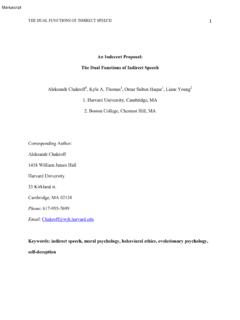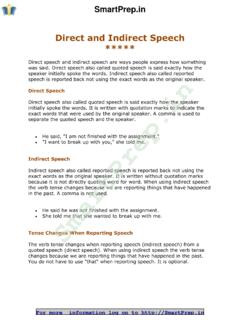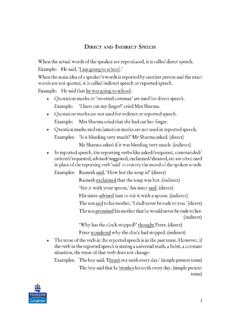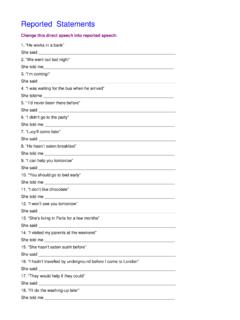Transcription of French Direct and Indirect speech - Kent Porter
1 French Direct and Indirect speechDiscours Direct et indirectIn French , there are two different ways to express the words of another person: Direct speech (or Direct style) and Indirect speech ( Indirect style). Direct speech is very simple: the exact words of the original speaker are reported in dit : J'aime les fraises .Paul says, "I like strawberries."Lise r pond : Jean les d teste . Lisa replies, "Jean hates them." Jean est stupide d clare Paul.* "Jean is stupid" Paul declares.*Inversion with Direct speech *Inversion with Direct speechIncidental clauses - Inversion is required when using a short clause to offset speech or clauses - Inversion is required when using a short clause to offset speech or clauses - Inversion is required when using a short clause to offset speech or speech - Verbs like to say, to ask, and to think that set off Direct speech - Verbs like to say, to ask, and to think that set off Direct speech .
2 Je vois, dit-il, que c' tait une bonne id e .*"I see," he says, "that it was a good idea." Avez-vous un stylo ? a-t-elle demand ."Do you have a pen?" she , thoughts - Verbs like to appear and to seem used to set off remarks or , thoughts - Verbs like to appear and to seem used to set off remarks or ont, para t-il, d'autres choses have, it appears, other things to tait, me semble-t-il, assez nerveuse. Anne was, it seems to me, rather Indirect speech , the original speaker's words are reported without quotes in a subordinate clause (introduced by que).Paul dit qu'il aime les says that he loves strawberries. Lise r pond que Jean les d teste. Lisa replies that Jean hates d clare que Jean est stupide. Paul declares that Jean is are many verbs (called reporting verbs) that can be used to introduce Indirect speech :affirmerto assertajouterto addannoncer to announcecrierto shoutd clarerto declaredireto sayexpliquerto explaininsisterto insistpr tendreto claimproclamer to proclaimr pondre to answersoutenirto maintainIndirect speech tends to be more complicated than Direct speech , because it requires certain changes (in both English and French ).
3 French Indirect SpeechDiscours indirectIndirect speech is more complicated than Direct speech , because it requires certain grammatical changes (in both English and French ).1. Personal pronouns and possessives may need to be changed:DSDavid d clare : Je veux voir ma m re .David declares, "I want to see my mother."ISDavid d clare qu'il veut voir sa m declares that he wants to see his Verb conjugations need to change to agree with the new subject:DSDavid d clare : Je veux voir ma m re . David declares, "I want to see my mother."ISDavid d clare qu'il veut voir sa m declares that he wants to see his In the above examples, there is no change in tenses because the statements are in the present. However, if the main clause is in the past tense, the verb tense of the subordinate clause may also need to change:DSDavid a d clar : Je veux voir ma m re.
4 David declared, "I want to see my mother."ISDavid a d clar qu'il voulait voir sa m declared that he wanted to see his following chart shows the correlation between verb tenses in Direct and Indirect speech ; use it to determine how to rewrite Direct speech as Indirect speech or vice versa. Pr sent/Imparfait to Imparfait is by far the most common - you don't need to worry too much about the verbSubordinate verb may verb may Direct speech - Indirect speech Direct speech - Indirect speechAUPASS Pr sent or ImparfaitImparfaitAUPASS Pass compos or Plus-que-parfaitPlus-que-parfaitAUPASS Futur or ConditionnelConditionnelAUPASS Futur ant rieur or Conditionnel pass Conditionnel pass AUPASS SubjonctifSubjonctifAu pr sentno changeno chang









